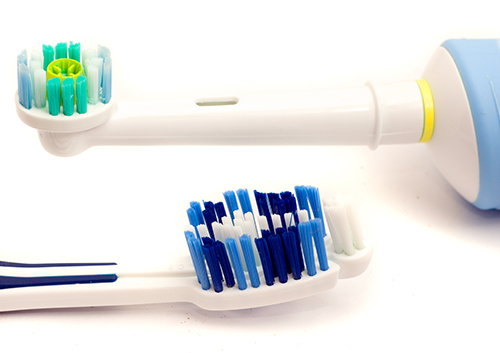February 5th, 2019

You live in the golden age of toothbrushes. Until a few decades people used twigs or brushes made from animal hair to clean their teeth: not very soft and none too effective.
Now, you have a choice of manual brushes with soft, medium, or hard bristles. Or you might choose to go with an electric toothbrush instead.
Have you ever wondered whether manual or electric brushes provide better cleaning? Actually, they both do the job. The key is to brush and floss every day, regardless of the kind of brush you prefer.
At our Marysville, WA office, we like to say the best brush is the one you'll use. So if you prefer manual, go for it. If you prefer electric, turn it on.
Both types have their advantages but both types will get the job done as far as removing plaque.
Electric Toothbrushes
- Provide power rotation that helps loosen plaque
- Are great for people with limited dexterity due to arthritis or other problems
- Are popular with kids who think the electric brushes are more fun to use
- Can come with variable speeds to help reduce pressure on sensitive teeth and gums
Manual Toothbrushes
- Can help brushers feel they have more control over the brushing process
- Allow brushers to respond to twinges and reduce the pressure applied to sensitive teeth and gums
- Are more convenient for packing when traveling
- Manual brushes are cheaper and easier to replace than the electric versions.
In many ways, the golden age is just beginning. There are already phone apps available to remind you to brush and floss. New apps can play two minutes worth of music while you brush, help you compare the brightness of your smile or help explain dental procedures. Maybe someday we’ll even have programs that examine your teeth after brushing and identify spots you might have missed.
January 29th, 2019

Recently, multiple studies have concluded that people with sleep apnea, a disorder that causes snoring, fatigue, and dangerous gaps in breathing at night due to throat muscles collapsing, are five times more likely to develop cancer. In fact, one of the studies found that people with the most severe forms of sleep apnea had a 65 percent greater risk of developing cancer of any kind.
Researchers believe this could be due to the body lacking enough oxygen, a condition known as hypoxemia. When people are deprived of oxygen, their bodies react by producing more blood vessels, which can feed cancer cells, and as a result cause tumors to grow and spread.
Approximately 28 million North Americans suffer from sleep apnea, with many cases going undiagnosed. This is due to most cancer patients not mentioning any sleep problems they experience unless their physician asks them.
Patients at Northwest Smile Design who suffer from sleep apnea can be treated using continuous positive airway pressure (CPAP) therapy, which produces a stream of air to keep the upper airways open while you sleep. An oral appliance may be another option if CPAP therapy isn’t an option. If you have sleep apnea, Dr. Kelly Peterson and our team will help you understand all of your treatment options, finding one that suits your needs.
If you think you may have sleep apnea, please give us a call at our Marysville, WA office to schedule an appointment.
January 22nd, 2019

It’s common knowledge that you should get your teeth cleaned every six months. But do you know why that timing is crucial? Studies have shown that your oral health connects directly to the rest of your body. Over time, an unhealthy mouth can cause trouble in other parts of your general system.
Undergoing a regular cleaning every six months at our Marysville, WA office is vital. During your dental checkups, we remove plaque that collects on your teeth and around your gums. If the plaque gets left in place for an extended period, inflammation can develop and may lead to painful gum diseases such as gingivitis and periodontal disease.
According to the American Academy of Periodontology, periodontal disease has been linked to increased risk for health conditions such as heart disease, stroke, diabetes, inflammation, and osteoporosis. Bacteria from your mouth can spread throughout the rest of your body. So a healthy mouth leads to a healthy body.
Regular checkups can prevent issues from arising in your mouth if problems are caught early by Dr. Kelly Peterson. If you have been avoiding the dentist, you could be making issues worse for yourself in the long haul. Generally, a dentist will go over a few routine matters during your checkup. They might include taking X-rays, checking for gum disease and tooth decay, examining your bite, inspecting your head and neck for swelling, and of course performing a thorough cleaning of your teeth and gums to remove built-up plaque and tartar. All of these routine practices are worthwhile when it comes to keeping your oral health in top shape.
Now that you know the importance of getting your teeth checked every six months, you should be sure to schedule your next appointment with Northwest Smile Design at our Marysville, WA location. Keeping your mouth healthy will prevent any form of bacteria from spreading to the rest of your body. If you have any questions or concerns regarding your oral health, don’t hesitate to call and our staff will be happy to assist you.
January 15th, 2019

Anyone who has had a compromised tooth knows that the amount of discomfort it causes can be extremely unpleasant. Although no one looks forward to a root canal, this procedure is actually the best way to both eliminate pain and save your tooth. If the pulp inside your tooth is infected or damaged, a root canal is probably necessary.
The process is relatively straightforward and can take place over one or two visits to our Marysville, WA office. The area around the tooth is numbed, the pulp is removed from the inside of the tooth, the area is thoroughly cleaned, and a temporary filling or crown is placed on the tooth to prevent bacteria and food from entering the site. A permanent crown will be fabricated and affixed to the tooth at a later visit.
Once your root canal is finished, recovery is usually only a matter of days. What can you to keep yourself as comfortable as possible during that time?
- The area around the affected tooth might be somewhat sore or sensitive for a few days. Let us know, and we can talk about medication to reduce pain and inflammation. If you are prescribed antibiotics, be sure to take the entire course of medication as directed.
- Taking an ibuprofen (if this is a pain reliever that is safe for you) before the anesthetic wears off will reduce the soreness in the hours immediately after the procedure.
- Wait until the numbness is gone before eating to avoid biting down on a temporary filling (or your tongue). Hot drinks are also best avoided.
- Avoid chewing on the side of the affected tooth until the restoration is complete. A soft diet is recommended for the first several days—chewy, sticky, and crunchy foods should wait.
- Continue with regular brushing and flossing.
- Call Dr. Kelly Peterson immediately if you experience severe pain or visible swelling, if you have an allergic response to medication, if your bite feels uneven, or if you lose the temporary filling.
Follow the instructions we’ll give you carefully, and feel free to call us with any concerns. We want to ensure that your root canal is as pain-free and worry-free as possible.










 Website Powered by Sesame 24-7™
Website Powered by Sesame 24-7™